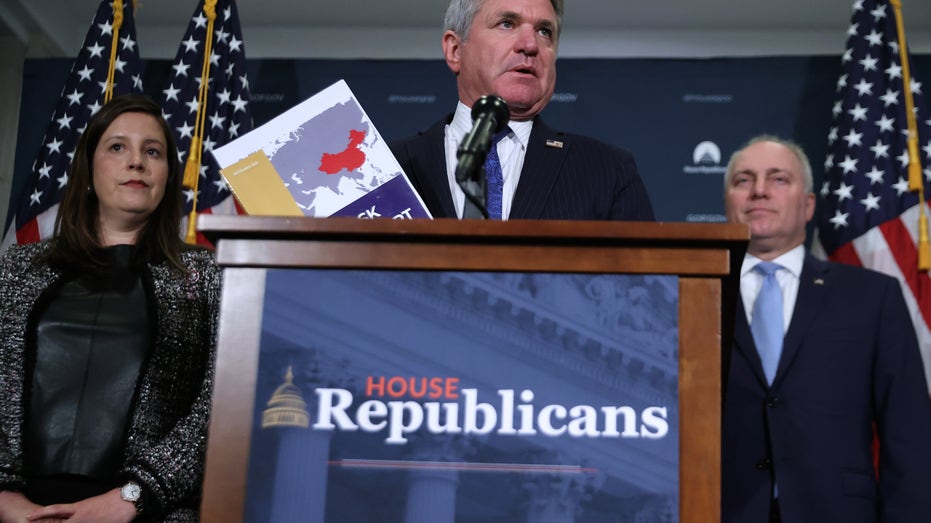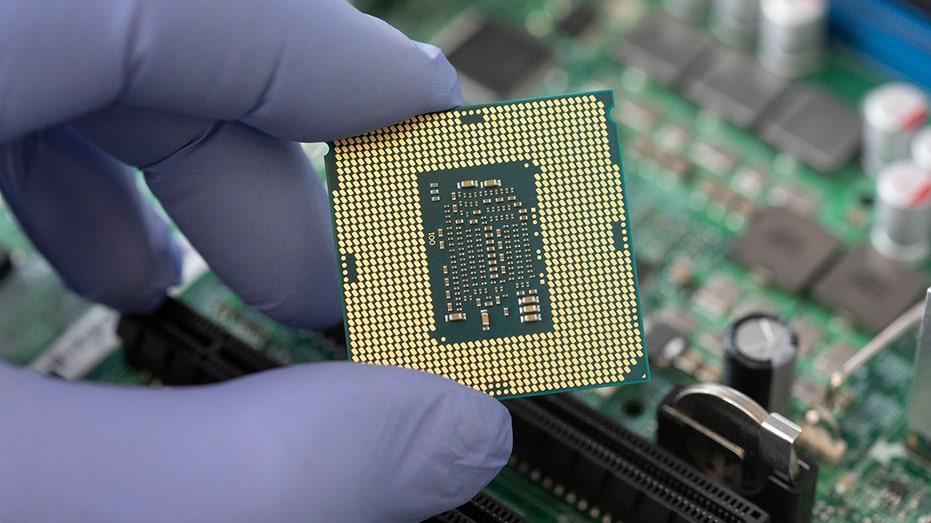Republicans slam Pelosi over China bill proposal: 'Not serious about confronting the CCP'
Republicans take issue with steep price tag despite cuts from Senate-passed bill to boost semiconductor production
Top Republicans in the House are taking issue with a bill introduced in the lower chamber that aims to curb competition with China and accused Democrats of not being "serious about confronting the [Chinese Communist Party]."
The bill, known as the America COMPETES Act of 2022, was unveiled in the House Tuesday by Democratic leaders in an attempt to bolster U.S. semiconductor production, address supply chain issues and invest in scientific and technological advancements.

Speaker of the House Nancy Pelosi, D-Calif., meets with reporters at U.S. Capitol. (AP Photo/J. Scott Applewhite / AP Newsroom)
SENATORS PUSH BIPARTISAN BILL TO BOLSTER DOMESTIC SEMICONDUCTOR PRODUCTION AS SHORTAGES LOOM
But what Democrats and the White House have championed as a bipartisan bill in response to the Senate-passed $250 billion U.S. Innovation and Competition Act (USICA), House Republicans have claimed is a stockpile of partisan issues.
"We have been in talks with House and Senate committees of jurisdiction for weeks, trying to put together a bipartisan bill that could pass Congress," Ranking Member of the Foreign Affairs Committee Rep. Michael McCaul, R-Texas, told Fox News Digital.
"I would strongly urge Speaker Pelosi and other House Democrats to scrap their weak, partisan bill and work with Republicans on comprehensive legislation that will actually counter CCP aggression and that has the ability to pass both Houses of Congress."
McCaul warned that the COMPETES Act could be dead on arrival in the Senate, even if it clears the Democratic-led House, so long as it contains partisan-heavy legislation like the EAGLE Act.
SEMICONDUCTORS 101: COMPUTER CHIPS SHORTAGES LEAD TO NATIONAL SECURITY CONCERNS

Rep. Mike McCaul, R-Texas, talks about China during a news conference with House Republicans. (Chip Somodevilla/Getty Images / Getty Images)
The House bill substantially cut funding allocated in the Senate USICA bill by dropping the $190 billion allocated for technology and research, as first reported Reuters. The bill instead includes $45 billion to bolster supply chains and the domestic production of critical goods.
The 2,900-page House bill does still include $52 billion to fund the manufacturing of U.S. semiconductors.
Despite the drop in price, Ranking Member Rep. Cathy McMorris Rodgers of the Energy and Commerce Committee has rejected the idea that additional funding will solve the U.S.'s supply chain issues.
A staffer for McMorris Rodgers told Fox News Digital that the bill "will not solve this supply chain crisis or secure America’s competitive edge against China."
"We cannot beat China at their own game with expansive government subsidies," they added.

A technician holds a central processor microchip known as a semiconductor over a circuit board at Bonn Proton Ltd. (Photo illustration by Ulrich Baumgarten via Getty Images / Getty Images)
CLICK HERE TO GET THE FOX NEWS APP
"Approaches like USICA or the America COMPETES Act — both massive expansions of government subsidies and federal control — are not how we beat China," McMorris Rodgers said in a statement Wednesday.
"From what I’ve seen so far in Speaker Pelosi’s bill, it’s another attempt to outspend the CCP with duplicative, multibillion-dollar command and control programs that will diminish our global competitiveness, fail to solve the supply chain crisis and make inflation worse," she added.
Minority Leader Kevin McCarthy echoed these sentiments by calling the legislation "toothless" and claimed it would waste "billions of dollars on unrelated matters."
"The COMPETES Act isn’t serious legislation – it is a façade to cover up the Democrats’ reluctance to actually do anything to hold China accountable and their desperation to do something to distract from their domestic crises," he added.





















